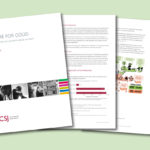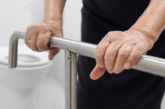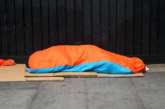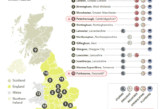A surge in homelessness triggered by domestic abuse has prompted calls for a radical new approach to helping victims, many of whom are women with children. Figures released this week show that the number of people forced into homelessness by an abusive or violent partner has risen by almost a fifth since the pandemic.
According to the Department for Levelling Up, Housing and Communities between July and September of 2022, 6,700 households were accepted as homeless by local councils because of domestic abuse, an increase of 4% from the 6,440 recorded in the same quarter of 2021, and up 19.6% from the 5,600 in the third quarter of 2020.
In a major new report, the Centre for Social Justice (CSJ) says that the pioneering Housing First programmes being piloted in major cities should be overhauled to make them more appealing to families fleeing domestic abuse.
The CSJ recommends that current rules, which mean only statutory services can refer victims to Housing First programmes, should be scrapped and charities and community groups given these powers. At present, women with children who have survived domestic abuse are reluctant to approach statutory services for fear that their children will be taken into care and they will lose them. But these fears do not apply to charities and other grassroot groups offering support to victims.
As part of its research for Home for Good: Housing First for domestic abuse survivors the CSJ spoke to a number of its 500 Alliance charities which confirmed a significant proportion of their clients report that local authorities fail to support them in finding a home away from their abuser, or specialist support to overcome their trauma.
Local authorities’ failure to deliver upfront support — particularly in terms of housing allocation — places a serious estimated burden on public services of £40,897 per person. This cost is accounted for by a statistically higher chance of those without upfront support going on to require homeless services and support for addiction and other complex needs.
Grassroot charities and community organisations that support domestic abuse survivors also reported their clients’ unsatisfactory interactions with statutory services. As the report explains: “Domestic abuse survivors regard statutory services with suspicion if not downright hostility. They report that police, health services etc often challenge their testimony, or minimise their plight; and that social services take away children when there are no safeguarding reasons to do so. Survivors are reluctant to report their abuse, therefore, and as a result, continue to live with abuse, or in a limbo of sofa-surfing or staying at friends’, often with children in tow. This existence risks tipping them into a spiral of despair that can lead to substance misuse, petty crime or prostitution. Moreover, the cyclical nature of this trauma risks compromising their children’s outcomes.”
Primarily funded by government and local authorities in partnership with the voluntary sector, Housing First ensures safe and stable housing for survivors as well as intensive, person-centred support. Analysis of the pilot in Liverpool has shown the cost per survivor to be around £10,000, however analysis by consultants estimates the saving to the public purse to vary between £27,000 and £66,000 compared to the costs of a homeless survivor.
The CSJ recommends that the model is further piloted through the unallocated £200m Single Homelessness Accommodation Programme (SHAP), which aims to support homeless individuals suffering multiple disadvantages. The CSJ also calls for the requirement of statutory services to refer survivors to Housing First — which currently deters so many — to be scrapped, with more funding directed at small grassroot charities and community groups.
Other recommendations by the CSJ include:
- The Department of Work and Pensions should exempt those who are at risk of sleeping rough or in emergency accommodation from the benefit cap, to ensure the rules of the benefits system are not driving homelessness.
- Expanding provision of domestic abuse services and refuges to male survivors, many of whom are the children of women survivors.
- Local authorities should ensure that they offer Discretionary Housing Payments to domestic abuse survivors who hold tenancy in the homes they flee.
Nicole Jacobs, the Domestic Abuse Commissioner for England who wrote the foreword to the report, said: “A safe home is crucial for all victims of domestic abuse and the report rightly argues that it is all the more crucial for those victims who struggle with multiple complex needs.
“This report by the Centre for Social Justice highlights some pioneering work which brought together specialist domestic abuse services alongside those addressing homelessness to shape and advocate for a much-needed programme of work.
“Through a Housing First model that caters for their complex needs, we can change an individual’s circumstances to support them in overcoming their experiences and getting back into society: this way we can ensure that even the most vulnerable victims can go from domestic abuse survivor to thrive playing a valuable role in society.”
Cristina Odone, the CSJ’s Head of Family, said: “Too many parents are suffering years of domestic abuse because they cannot find a home, and they know that becoming homeless risks losing their children. This cruel system has to change. It’s time that local authorities met the clear demands made by the Domestic Abuse Act: they should prioritise survivors of domestic abuse when it comes to housing.”










